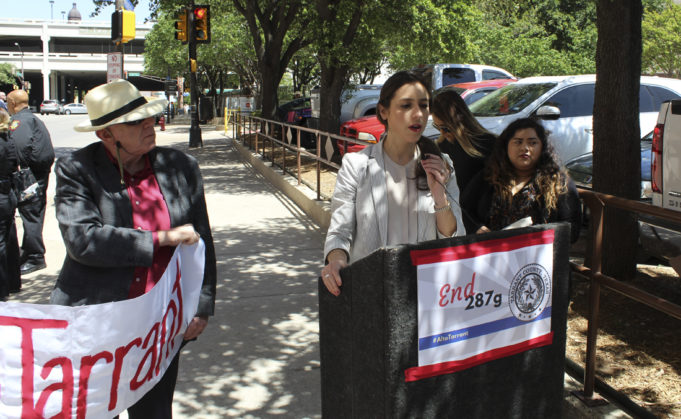Local folks of color, in an ironic turnabout, are asking Tarrant County Sheriff Bill Waybourn to show them his papers.
The 287(g) agreement between U.S. Immigration and Customs Enforcement (ICE) and the Tarrant County Sheriff’s Office dates back to July, when ICE announced an agreement with 18 Texas counties to allow a limited number of county jail officers to be trained by ICE agents. David McClelland, the spokesperson for Waybourn, said the agreement allows for greater local control over immigration issues, which means the interrogation of suspected undocumented individuals can be handled without ICE agents present.
Critics say 287(g) amounts to a “show me your papers” policy that unfairly targets the Hispanic population.
Tarrant is the largest county in Texas to partner directly with ICE for training purposes through the 287(g) agreement.
Last Wednesday, several members of United Fort Worth, a grassroots cross-cultural and multi-ethnic alliance of Fort Worth-area residents opposing discriminatory policies and legislation, gathered outside the sheriff’s office for a short press conference before entering to hand over a public information request. The request, carefully prepared with the help of lawyers from the immigrant advocacy group RAICES, seeks details about stated goals and objectives of the 287(g) agreement. United Fort Worth is also seeking information on costs associated with the program and the total number of ICE detainers (requests to hold individuals) filed through it.
RAICES managing lawyer Jennifer de Haro said she has spoken with numerous clients who are “afraid to interact with the police” because of policies such as 287(g).
“The sheriff said this agreement only affects those arrested for a misdemeanor, but nothing in the 287 agreement itself has this restriction,” she said. “While we have an idea of how the program operates, there are many details that are in the dark. That is why RAICES is here with United Fort Worth to ask the sheriff’s department and the [Tarrant County] Commissioners Court to release their information about this harmful program.”
In March, Waybourn discussed the 287(g) program at a Hispanic Chamber of Commerce meeting attended by one of our reporters. Criminals, Waybourn said, are what 287(g) deals with, not “good, hard-working people.” He again defended the program at a recent meeting of the Fort Worth Race and Culture Task Force, telling the advisory panel that his department must be trained by ICE due to the federal agents’ limited availability. The task force will present its final report, which outlines incidents of “systemic racism” within the city, to the Fort Worth City Council later this year.












